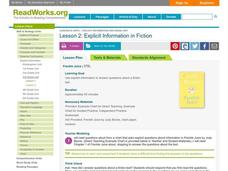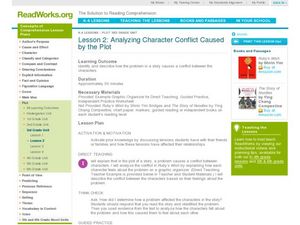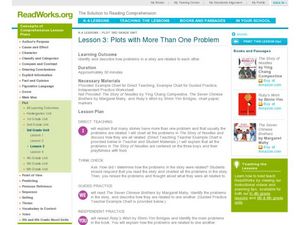Curated OER
Identifying Descriptive Language
Third graders analyze a text to find descriptive language. In this language arts lesson, 3rd graders read a text looking for descriptive words that describe the character.
Curated OER
Changes in Character
Third graders read the book Hi New Baby! and identify how the main character changes throughout the story. In this character lesson plan, 3rd graders write descriptive clues to explain the changes in feelings of the character.
Curated OER
Organizing Information into an Outline
Young scholars explore outlines. In this nonfiction comprehension and study skills lesson, students complete a traditional outline for the book Animal Homes by Ann O. Squire following guided instruction as the teacher models gathering...
Curated OER
Explicit Information in Fiction
Third graders read the story Freckle Juice and answer short answer questions by providing explicit information. In this explicit information worksheet, 3rd graders do this for chapters 3, 4, and 5.
Curated OER
Facts and Opinions in a Variety of Genres
Here is a lesson dedicated to helping learners understand the differences between facts and opinions. They examine the first page of several books from the class library to determine if the book is fact or opinion based. A Venn diagram...
Curated OER
Distinguishing Facts from Opinions
Third graders use a scavenger hunt worksheet to look through classroom books and resources and identify facts and opinions. In this fact and opinion lesson plan, 3rd graders look through non fiction and fiction books.
Curated OER
Similes
A simile is a non literal phrase that needs to be deciphered for contextual meaning. Similes are also fun to read and write. Third graders get cozy with similes found in the book If You Hopped Like a Frog by David M. Schwartz. They use...
Curated OER
First and Last Sentences
Third graders discover how to read sentences in a paragraph and know the main idea. In this main idea lesson, 3rd graders read paragraphs, underline the first and last sentences and determine the main idea. Students do guided and...
Curated OER
Analyzing Character Conflict Caused by the Plot
How do we know how a character was affected by the conflicts they encounter in a story? We use evidence from the text to make assertions about the characters we read about. Third graders practice finding and using evidence in a short...
Curated OER
Plot with More Than One Problem
Every good story has a plot, and every good plot contains a conflict or problem. Third graders familiarize themselves and identify how problems in a story are connected. First as a class and then in small groups or individually, learners...
Curated OER
Predicting Based on Character Relationships
Students read a book. In this making predictions lesson, students learn how to make a prediction in a story and discover how character relationships can help in their predictions. Students read a story stopping to make predictions.
Curated OER
Visualizing A Setting
Third graders use context clues from the text of the story Rainy Day to determine the setting. In this setting lesson plan, 3rd graders determine the time and place by visualizing.
Curated OER
Determining Theme Based on Events in the Story
Third graders read the book How the Fox Tricked the Tiger and determine the theme based on the events in the story. For this theme lesson plan, 3rd graders list the events in a graphic organizer.
Curated OER
Lesson 1:Contrasting Statements
Third graders use contrasting statements to find the meaning of new vocabulary. In this literacy instructional activity, 3rd graders read a contrasting statement and use the first part to identify the meaning of a word in the second half.
Curated OER
Appositives
Third graders use the text about a beetle life cycle to identify unknown vocabulary words. For this appositives lesson plan, 3rd graders define the words on the worksheet they are given.
Curated OER
Identifying Author's Purpose in a Newspaper
Fourth graders read the newspaper and identify the author's purpose. In this language arts lesson, 4th graders read two sections of the newspaper and analyze the characteristics of each section. Students explain in writing how they know...
Curated OER
Categorizing Texts According To Author's Purpose
Young scholars categorize books into the 3 different kinds of author's purpose. In this author's purpose lesson plan, students categorize them into the categories of entertain, inform, and persuade.
Read Works
Cause and Effect Relationships in Historical Fiction
Centered around the book Pink and Say, by Patricia Polacco, the lesson presented here should help your class tackle cause and effect. The teacher reads the first few pages aloud and models in a think-aloud style how to identify cause and...
Curated OER
Cause and Effect Relationships in Myths
Fourth graders read the myth Why the Cat Purrs and point out the cause and effect relationships in the myth. For this cause and effect lesson plan, 4th graders write a short paragraph about why the cat purrs.
Read Works
Protagonist
Teach your class how to identify the protagonist in a story. The plan suggests starting with a protagonist from a tale you have previously read in class. Then, you can read a new story and work together to identify the protagonist,...
Read Works
Using Text Features to Find Information
If you are working on a research project, consider this resource. First, model how to use notes and text features to create an outline. Next, allow individuals to choose a topic and complete the same process that you showed them....
Curated OER
Explicit Information versus Drawing Conclusions
Fourth graders read a comprehension passage and answer short answer questions and then identify their answers as explicit information or drawing conclusions. In this comprehension lesson plan, 4th graders do this as a whole and individuals.
Curated OER
Locating Facts and Opinions in a Newspaper
Fourth graders discuss the difference between fact and opinion. In this language arts instructional activity, 4th graders search the newspaper and identify factual articles and opinion based articles. Students discuss what makes the...
Curated OER
Editorials- Facts that Support Opinions
Fourth graders complete a worksheet. For this author's opinion lesson, 4th graders read editorials and determine how the use of facts supports the author's opinion. Students complete a facts to support opinions chart.

























